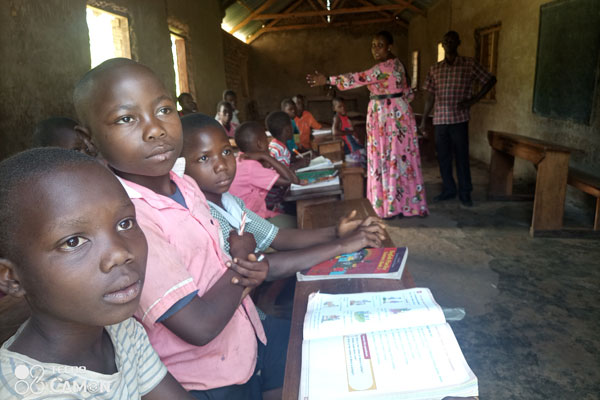Prime
Compulsory schools milk policy hangs in the balance

Pupils of St Mary’s Kiryowa Primary School in Buikwe District are served porridge during break time on April 11, 2019. PHOTO /DENIS EDEMA
What you need to know:
- Cabinet is expected to sit today to decide on the fate of the milk programme.
The government is contemplating calling off its compulsory milk-feeding programme due to budget constraints, this publication has learnt.
Last year, the government introduced the programme, with a pilot in the districts of Kampala, Wakiso and Mukono. Parents with learners in both private and government schools would be required to pay for compulsory milk to boost their children’s health.
Inside sources at the Education ministry told this publication that the programme, which was meant to be rolled out nationally once schools resume in February, has invoked questions about its viability.
While a section of ministry officials wanted the government to drop its compulsory element, others are alive to the fact that the ministry is reportedly financially constrained to run the programme. “Government doesn’t have money,” our source told us, adding that “the Cabinet … is going to make the final decision tomorrow (today).”
Last September, the government revealed that parents with schoolgoing children would be required to dig in their pockets in a bid to improve the protein intake of pupils. While the Education ministry started piloting the milk-feeding programme in 13 local government schools in Mukono, Kampala and Wakiso, it had planned to roll it out to the rest of the country in January this year.
The ministry argued that the programme would improve the performance of learners, ensure good nutrition and reduce school dropouts.
Pilot
Five years ago, the government piloted the milk-feeding programme in at least seven milk-producing districts in southwestern Uganda.
Deriving the mandate from the school feeding policy guidelines (2013), the Netherlands Development Organisation (SNV) and the Ministry of Education and Sports in 2017 rolled out schools milk programmes in the southwestern districts of Mbarara, Sheema, Kiruhura, Isingiro, Lyantonde, Ntungamo, and Bushenyi.
Parents in the seven districts were paying between Shs10,000 to Shs15,000 per term for their children to have a cup of milk each day.
On Sunday, Mr George Muteekanga—the assistant commissioner of private schools and institutions in the Education ministry—confirmed that the Cabinet is sitting on Monday to decide on the fate of the programme.
“We have a meeting tomorrow with Cabinet [to discuss and take a position], and I think I can give you the answer after tomorrow’s (today’s) meeting,” Mr Muteekanga said via telephone before revealing that milk-feeding programme pilot had run successfully in Kampala, Wakiso and Mukono.
Mr Muteekanga said it was disappointing that the milk programme has been politicised and is being conflated with other programmes.
Bad timing?
Analysts have, however, continued to question the viability of the programme. They hold that it comes at a time parents are struggling with exorbitant school fees amidst a cost of living squeeze.
Mr Filbert Baguma, the Secretary General of Uganda National Teachers’ Union (Unatu), says the milk-feeding programme is “confusing and irrational.”
“The government came out to say no headteacher should charge any money in a UPE and USE school. When you say no headteacher should charge a parent, then you don’t bring in something that requires a parent to pay,” Mr Baguma reasons, adding that he doubted whether “we have milk that is enough to provide to all schools.
The Unatu top official also said that if given green light, the programme “must start with rural schools instead of urban.” On his part, Mr Muteekanga said the ministry planned to deal with major milk processing companies in the country to supply the milk in schools.
ALSO READ: The balanced diet in milk
“We are using those big milk processing companies to sell the milk to the schools but not us supplying (as a ministry),” Mr Muteekanga said, adding that the milk would be sold “at a subsidised cost … half price.”
According to Uganda Dairy Development Authority, the country produces approximately 2.8 billion litres of milk annually. Of that quantity, 19.2 percent or 532 million litres is consumed at the household level, 46.8 percent or 1.4 billion litres is processed and consumed locally while 34 percent or 952 million litres is processed and exported.
Although milk production has for the last seven years been growing at about 74 percent, consumption remains low with per capita consumption of about 60 litres as opposed to 200 litres.
Unsustainable
Mr Fagil Mandy, an education analyst, says the programme’s timing was not only wrong, but unsustainable. He stated that there is no evidence to suggest that the programme is viable.
“There are many programmes, which we have started under UPE, USE, etc and have not been viable. Do we have enough money to run the programme? Its viability is doubtable since the parents will be charged for the milk,” he says.
Mr Mandy addds that any programme that involves slapping charges on parents is likely to fail.
“The atmosphere of charging anything beyond school fees, especially at the time when we are launching the guided fees structure, the two don’t work together, and will the ministry make sure that milk is being charged the correct amount?” he wonders.
According to Mr Mandy, “charging parents any money which they have not been paying before is very unsustainable.”




